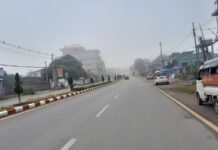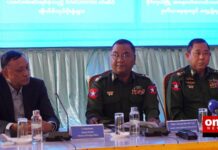Referendum on independence has been an issue dominating the headlines for a couple of weeks now, particularly in relation to the Catalan and Kurdish movements in trying to realize their aspirations to achieve statehood. While generally it might seem to be irrelevant for general public, many stateless nations, which were estimated to be somewhere near 1600, are following, studying and observing all these crucial developments so that they would be able to respond regarding secession issue to their advantage appropriately in navigating the international political waters.
No doubt, the non-Bamar ethnic nationalities of Burma that are interested to maximize their aspirations of rights to self-determination would be observing the Catalan and Kurdish situation closely like the rest of stateless or non-state nations.
But first let us look at the present development of the two said stateless nations and their prospective to achieve statehood.
Controversial referendums on independence were held in Iraqi Kurdistan on September 25 and the Spanish region of Catalonia on October 1.
Catalonia
 Madrid seems to have crushed the Catalan’s statehood aspirations by making decision to suspend its autonomy and replaced with the Madrid direct rule using Article 155 stated in the 1978 Spanish Constitution on October 21.
Madrid seems to have crushed the Catalan’s statehood aspirations by making decision to suspend its autonomy and replaced with the Madrid direct rule using Article 155 stated in the 1978 Spanish Constitution on October 21.
It says that if a regional government “doesn’t comply with the obligations of the Constitution or other laws it imposes, or acts in a way that seriously undermines the interests of Spain”, the national government can ask the Senate to vote on the use of the measure.
The Constitution states that an absolute majority must approve the article’s use, which would easily sail through with the majority backing for Spain’s Prime Minister Mariano Rajoy. But the problems that Madrid would face are the massive mass protest in exercising such direct rule, resistance to the arrest of the Catalonia government functionaries and the question if the Catalonia police forces would listen to the central government in Madrid.
The Spanish Senate is expected to approve the government’s measures on Friday along with a proposal for fresh regional elections. But Catalan leaders say they will not accept the plan.
Catalan authorities made it clear that they will not follow orders from the Spanish government if Madrid moves to reassert control over the region, a senior official says, according to the BBC report of October 23.
Speaking to BBC Radio 4’s Today programme, Foreign affairs spokesman Raul Romeva said: “How can the European Union live with that situation [if this happens]. How can the EU democracy survive and how can they be credible if they allow this to happen?
“Because what I can tell you is that the people and the institutions in Catalonia will not let this happen,” adding that the Spanish government needed to recognize that the people of the region had voted for independence.
Earlier, on October 21 night Catalan President Carles Puigdemont, speaking in Catalan, Spanish and English, described the move as the worst attack on Catalonia’s institutions since General Franco’s dictatorship between 1939 and 1975, under which regional autonomy was dissolved, according to The Guardian report of October 22.
He said: “We cannot accept these attacks. Those who have scorned the Catalans now want to govern us. I will ask parliament to decide how to respond to these attacks on democracy and to act accordingly.”
The EU and the US backed Madrid and have refused to act as mediator in the dispute saying that it is Spain’s internal affair.
Kurdistan
Iraq, Turkey and Iran have also already started working to oppose Kurdistan’s move towards statehood since a disputed referendum on September 25. Especially after developments in Kirkuk, where the Kurdish troops withdrew almost without a fight when the Iraqi troops marched in, it has started to look like a more viable option for the Kurds to use their vote for independence as a springboard towards negotiations with Baghdad for a new arrangement.
Although the independence referendum had given the main parties – the late Jalal Talibani’s Patriotic Union of Kurdistan (PUK)and Barzani’s Kurdish Democratic Party (KDP) – a shared goal, the Iraqi army’s swift advance and occupation of Kirkuk have divided them again, with both sides blaming the other for the fall of Kirkuk.
Barzani’s KDP accused the Talibani’s PUK of “historic treason” and claimed its members had met with Iraqi and Iranian officials and struck a deal not to defend the province, while PUK spokesman Sadi Ehmed Pire told reporters the events in Kirkuk were a direct result of the referendum, according to Irin News of October 23.
Kirkuk, which is not within the territory of Kudistan and taken over by the Kurdish forces from the ISIS in 2014, has been essential to the oil-dependent Kurdish economy for the past three years, with up to 600,000 barrels a day exported through a pipeline it built to Turkey, much to Baghdad’s chagrin, according to The Guardian report of October 21.
US Secretary of State Rex Tillerson says that the recent movement of Iraqi forces into areas in northern Iraq was aimed at bringing Iraqi control to areas it held before the ISIS war and that Washington has urged the Iraqis and Peshmerga to avoid confrontation, adding that many Kurdish rights and expectations have not been met by Baghdad and that Prime Minister Abadi has promised to commit to the constitution, reported Rudaw on October 23.
However, Rudaw on the same day reported the Patriotic Union of Kurdistan (PUK) and the Kurdistan Democratic Party (KDP) who met with 30 other parties in the Kurdistan Region, stated on October 22 that they will not give up on the Kurdish vote for independence, but that they are ready for dialogue.
The statement on behalf of the Kurdish parties read that they consider calls from the international community to begin talks, and are ready for unconditional dialogue with the central government.
“We have always been wanting to have dialogue, but the Iraqi side has chosen a military logic,” read the statement published after the meeting of the parties in Erbil.
“We hereby declare to all parties that we are prepared to have unconditional dialogue on the basis of the constitution, away from imposing the policy of de facto, attacks or military arrogance. Iraq needs to come to the discussion table on the basis of recognizing the rights of Kurdistan nation. To this end, the government of Kurdistan will represent Kurdistan’s nation.”
Baghdad on the other hand set a number of conditions to begin dialogue with Erbil on October 21.
“Holding any talks with Baghdad will surely be on the basis of conditions, namely the integrity of Iraq, the constitution, handing over border ports, airports, the country’s wealth, Peshmerga forces, Kurdish security establishments, enforcing the law in disputed areas and preventing any move which might be taken by the Kurdistan Region contrary to the constitution,” Saad al-Hadithi, the spokesperson for the Iraqi government said.
Secession and international norms
The problematic in the issue of secession is, as have time and again been pointed out, the clash of internationally accepted territorial integrity and the rights of self-determination norms.
Touching on the issue, Max Fisher and Amada Taubt wrote in The Independent recently that the modern international system is built, in part, on two ideas that turned out to be in tension as “Borders are sacrosanct and people determine their own political status.”
The former was meant to put an end to war by discouraging invasion or separatist rebellion. The latter was meant to protect citizens from dictators or occupiers. But when a subset of a population decides to break off, those two principles collide, explained Fisher and Taubt.
They said this has opened a vacuum in the international system when it comes to declaring independence. Neither norms nor the law are particularly clear on how or when it’s permissible. In practice, great power politics fill the vacuum, determining when a state’s right to uphold its borders does or does not trump a group’s desire to break away.
In short, the existing states are reluctant to recognize unilateral declaration of independence, as could be seen by the suggestion of the then UN Secretary General Boutros Boutros-Ghali in 1992 that: “If every ethnic, religious or linguistic group claimed statehood, there will be no limit to fragmentation, and peace for all would become even more difficult to achieve.”
Furthermore, the principle of rights to self-determination’s weakness is pinpointed by the LawTeacher as follows: “One major weakness of the principle of self determination arises from the definitions associated with the principle. The principle uses words such as “peoples” which have not been defined in international law. In UN resolutions, “peoples” is seen as a territorial unit’s entire population regardless of differences in characteristics of the population. However, in international law, minorities and other ethnic groups are not recognized as separate peoples.”
Secession outcomes
Given such a vacuum in the international system regarding secession there are different sets and variety level of achievements in trying to reach the aspirations of statehood.
For example Turkish Cypriots is only recognized by Turkey.
Also in the same vein as Turkish Cypriots, Ukraine’s Donetsk and Luhansk Republics, Georgia’s Abkhazia and South Ossetia are only supported by Russia
Perhaps the most desirable option outside international system would be an example of Taiwan, as it looks much more like a state compared to some of the examples mentioned and is among the world’s largest economies, despite the fact that it is officially recognized only by a small number of states.
One of the ways in which Taiwan has managed to survive relatively well in the system of states is by showing some flexibility in how it promotes itself, such as taking part in the Olympics under the name “Chinese Taipei”. It also has some powerful allies, such as the US, which helps it to develop pretty effective relations with the rest of the world, according to George Kyris, Lecturer in International and European Politics, University of Birmingham, in his article “Catalonia and Kurdistan find the road to statehood filled with obstacles”, in The Conversation.
Somewhat similar to Taiwan is Kosovo, which is supported by the United States and its European allies, it was bitterly opposed by the Serbian and Russian governments. Today, although recognized by over 100 countries and become a member of the international institutions such as the International Monetary Fund and World Bank, though not of the United Nations.
Analysis
Given such international mood and configuration, the Catalan and Kurdish struggle to achieve statehood will be an uphill battle and success to attain statehood in the near future is hard to imagine.
Looking at the different types of outcome stemming from secessionist movements we can roughly divide them into minimal, moderate and maximal successful ones.
Those with just one country endorsement of their independence declaration will be within the minimal category, while Kosovo, Taiwan and the like with more than one country recognizing them will be taken as within the moderate class. The maximal category will include Bangladesh, East Timor, South Sudan, Palau and 34 newly independent countries that have been created since the dissolution of the USSR and Yugoslavia in the early 1990s.
Many independence aspiring ethnic groups within Burma might also like to calculate on how they would fare in striving for the right to self-determination, especially the extreme type secession, and what their chances would be.
If we look at the hard facts, we would see that Shan State has declared unilateral independence twice once at the height of Mong Tai Army (MTA), fielding some 20,000 Shan troops, by Khun Sa in 1993 and again in 2005 by a group of Shan elders headed by the late Tiger Yawnghwe or Sao Surkhanpha, the eldest son of Burma’s first president, Sao Shwe Thaike, who had lived in Canada. Both independence declarations never develop into anything substantive and without any recognition from any existing state, the aspirations of achieving a statehood just fade away as time goes by.
Again, if one observes the Wa Self-Administrative Division which the United Wa State Party/Army (UWSP/UWSA) likes to call Wa State and although it totally controls and administers the area with its some 30,000 well-armed troops, it hasn’t declare independence for it knows that China, which strictly adhere to territorial integrity, won’t cater to it. That is why it has been aiming a sort of confederation arrangement within Burma through the Federal Political Negotiation and Consultative Committee (FPNCC), a seven-party ethnic alliance that it also leads.
To sum up, the Ethnic Armed Organizations (EAOs) after years of toying with the idea of total independence have settled in with the idea of federal union system of governance, due to the prevailing international and regional actors’ moods regarding the strong type solution of rights to self-determination through secessionist movement.
But this is not to say that ethno-nationalism is dead. In contrast the upsurge of this trend is unstoppable seen from what has happened and continues to be unfolding becoming the mainstay of today’s international politics. Undoubtedly, new values and needs adjustment regarding rights of self-determination, including the extreme form of secession, will be discussed, advanced and implemented.
The most daunting part of it will be on how to determine whether other ethnic groups, rather than just the dominant ethnic group that usually is vested with political decision-making power, ethnic minorities and indigenous groups will be recognized as separate peoples that could benefit from the principle of the rights to self-determination.
No doubt, the Catalonia and Kurdistan issues would continue to push the international community to rethink and remold its values and needs setting to be in tune with the ever changing world. Innovation in theoretical thinking on how to logically fuse the territorial integration and rights of self-determination, emphasizing on the definition of “people” and who is entitled to exercise the rights of self-determination, will certainly be worked out, even if we don’t know when this will happen. Already there are theoretical rights on the issue of secession like “Remedial Right Only Theory” and “Primary Rights Theory” advanced by Allen Buchanan and the likes, but barely put into practice in realpolitik.
Meanwhile, we all will have to just make do with the international tools that are available to us and that includes the accommodation and demands of the minority rights; and decentralization or devolving greater decision-making power to new or existing sub-units or autonomous areas, if open conflicts are to be avoided.












Leave a Comments